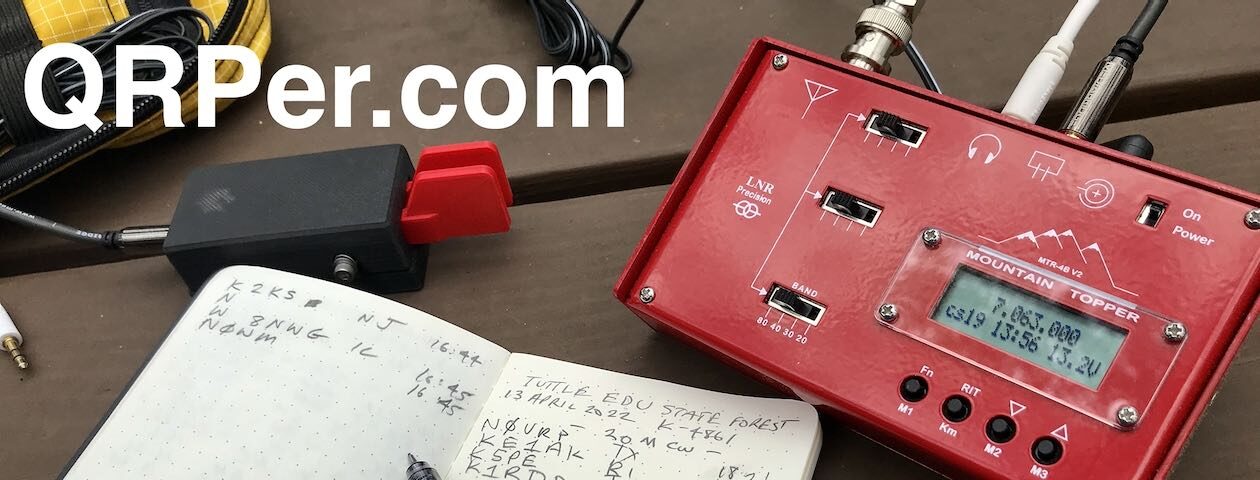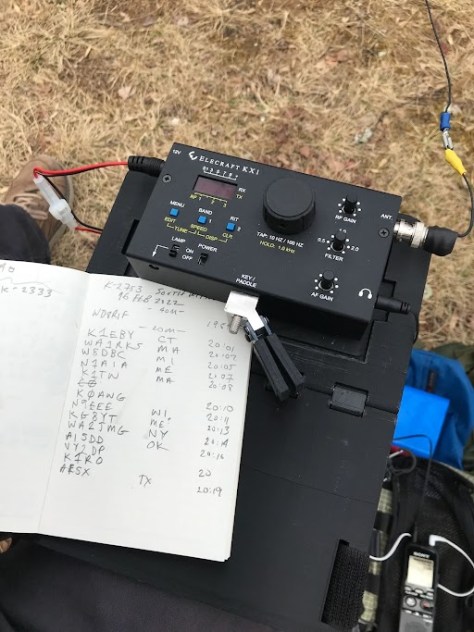 I might have mentioned in a previous post that I named my little Elecraft KX1 “Ruby.”
I might have mentioned in a previous post that I named my little Elecraft KX1 “Ruby.”
I name all of my field radios that are permanent; ones I never plan to sell or trade at any point in the future. Ruby is firmly in that keeper list.
Why do I anthropomorphize field radios? That’s perhaps a discussion for a different day but I reckon it’s because I feel they have a lot of character and are, quite literally, trusted companions. They go with me on travels, hikes, and all sorts of outings.
Ruby love
So Ruby is actually the second KX1 I’ve owned.

The first one I purchased in 2008 as a reward to myself for learning CW (see photo above). I enjoyed that KX1 until 2016 when I sold it to help fund the purchase of my KX2.
I immediately regretted selling it, although it helped that I sold it to an amazing person.
In October 2020, I purchased Ruby and wrote a post about how great it was to be reunited with this gem of a radio.
At the time, I had no idea what a great deal I had landed.
Ruby turned out to be a four band radio (it was advertised as three), included the built-in ATU, and the package came with a simple wire antenna, three different coaxial DC plugs, a Pelican 1060 waterproof case, earphones, and a set of KXPD1 paddles. All of this for $300 US shipped.
I took Ruby on a number of field activations and couldn’t have been happier
Intermittent issues surface
 In the summer of 2021, I started noticing some odd behavior.
In the summer of 2021, I started noticing some odd behavior.
Sometimes, after turning on the power switch, the rig wouldn’t completely power up. Instead of the typical two clicks we KX1 owners are accustomed to hearing, I only heard one click and neither the display nor any of the functions worked.
This was an intermittent issue–the next day it might power up as it should.
I did a little troubleshooting: I completely disassembled it, visually inspected all of the solder joints, and removed/cleaned and reinserted the firmware chip. This had no effect at all.
So, I took Ruby to one of the best radio repair technicians in the world who also happens to be one of my best friends: Vlado (N3CZ). He actually does a lot of repair and even has a radio repair website.
Dr. Vlado

Vlado will be the first to tell you that the worst problems to diagnose are those that are intermittent; it takes much longer to trace the source of the problem.
A few days later, Vlado sent me a message notifying me that the patient (Ruby) was on the operating table and surgery was about to begin. (See why I call him “Dr. Vlado”–?)
Vlado checked the circuit board very carefully. He found a few solder joints that needed work including a couple on the chip holder. In fact, he completely desoldered the chip holder and soldered it back in properly. Keep in mind here that the KX1 was only ever available as a kit, so quality had everything to do with the skill of the original builder.
He re-assembled Ruby and she worked perfectly.
A second operation
 I put Ruby back on the air for a few months, but then in December 2021, a variation of the same issue resurfaced. This time, the “two clicks” in startup took a couple seconds longer than it should. Then it simply stopped working altogether.
I put Ruby back on the air for a few months, but then in December 2021, a variation of the same issue resurfaced. This time, the “two clicks” in startup took a couple seconds longer than it should. Then it simply stopped working altogether.
Vlado wanted Ruby back in surgery ASAP, so I dropped her off at his “Emergency Room.”
Since the problem was no longer intermittent, Vlado quickly sorted out the main issue: a faulty encoder.
I should note here that since the KX1 hasn’t been produced by Elecraft in many years, there’s always the fear that a replacement part might already be “unobtainium.”
I called Elecraft support and fortunately for KX1 owners everywhere, the encoder is one Elecraft uses in a few of their radios. They have a healthy inventory and the part costs less than $5.00. Woo hoo!
Admittedly, when I placed the order, I also order a few extra parts I thought could fail in the future and might be difficult to find: 3.5mm jacks, pots, and even the LED screen. If I was paying shipping anyway, why not add a few extras? The parts are all very reasonably priced.
The KX1 doesn’t seem to have a lot of unobtainium in it–I seem to recall though that the firmware chip can no longer be ordered from their website and neither can the pushbuttons. I bet you could find other pushbuttons if needed, though.
I had the encoder shipped directly to Vlado and he completed Ruby’s operation in short order. Thank you, Vlado!
To the field!
I’m so happy to have Ruby back on the air! We’ve chased numerous parks and summits in the past week and I took her on an activation Monday, pairing her with my recently-built K6ARK EFHW antenna.
I’ll post an activation report and video in the coming weeks.
KX1 advice
 Elecraft KX1s have become as rare as hen’s teeth lately. You’ve no doubt noticed this if you’ve been looking for one. I’m sure I could sell my KX1 package in a heartbeat for twice more than I paid a year and a half ago. It’s a little insane, really, but I get it.
Elecraft KX1s have become as rare as hen’s teeth lately. You’ve no doubt noticed this if you’ve been looking for one. I’m sure I could sell my KX1 package in a heartbeat for twice more than I paid a year and a half ago. It’s a little insane, really, but I get it.
If you’ve been looking for a used KX1, I would offer the following notes/advice:
- Since these were only available as kits, you might ask the seller about the original builder and/or have them take photos of the soldering work inside prior to purchasing.
- Assume issues might arise with time. With radios like this, I mentally set aside at least a couple hundred dollars for future replacement parts and/or repairs.
- Keep in mind that as with any other radio that’s a bit long in the tooth, you may find that some components are simply no longer available. That’s the risk we take being custodians of these cool little rigs.
- Actively looking for a KX1 at time of posting (Feb 2022)? Note that interest in particular radio models waxes and wanes over time. With a little patience, you’ll eventually find one. I’ve seen this happen with so many other radios over the years.
- The KX1, as with most Elecraft radios, comes in a number of configurations and you need to be aware of this if purchasing. Some only have two bands, some have three, and some have four. I’m not certain if band modules are still available via Elecraft, so you might get stuck with the configuration you purchase. Also, the internal ATU was an option; don’t assume the one you’re purchasing has the ATU.
- KXPD1 paddles are very difficult to find these days. It’s a big bonus if your radio comes with them. Not everyone likes these paddles, but the version I have now seem to work really well, actually. N6ARA Tiny Paddles are a brilliant little replacement, but you might wish to make a 3D-printed holder to attach the the paddle point on the front of the radio to take a little strain off of the 3.5mm jack inside.
I should also add that Vlado is a brilliant repair technician and has worked on numerous Elecraft, Icom, Yaesu, Kenwood, and Ten-Tec models over the years–if it’s solid state, he can repair it. If you ever need his services he can be reached via his website HamRadio.repair.
Also, Dave (W8FGU) is an Elecraft employee that is devoted to their legacy radios like the KX1/KX1/K2, etc. He’s a great guy, brilliant resource, and I believe can also arrange repair, if needed.
Enough blogging: I think Ruby and I will chase a few summits now while I finish my morning cuppa’. 🙂




